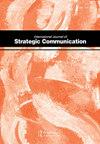当有效利用战略沟通(公共外交和公共关系)使国内冲突国际化不足以获得国际政治支持时:加泰罗尼亚案例(2012-2017)
IF 1.9
Q1 COMMUNICATION
International Journal of Strategic Communication
Pub Date : 2021-08-08
DOI:10.1080/1553118X.2021.1910514
引用次数: 0
摘要
摘要2012年发起的加泰罗尼亚民族主义独立运动的主要目标之一是将加泰罗尼亚和西班牙这两方之间的冲突国际化。以加泰罗尼亚为例,它的故事试图向世界提供一个通过和平方式强烈动员起来支持自由和独立的整个社会的观点,而西班牙将体现在一个精英主义的、不可简化的、封闭于理性和谈判的防御性政府中。本文描述了支持独立运动对战略沟通(主要是公共外交和公共关系)的使用,这是一种软实力和后现代资源,反对西班牙政府使用现代和硬实力手段(包括诉诸法院、警察和财政压力等手段)。它描述了加泰罗尼亚支持独立运动对战略沟通的有效利用,包括准外交努力以及积极的新闻报道,甚至“假新闻”。尽管如此,该运动未能获得欧盟(EU)、联合国(UN)等超国家组织的政治支持,甚至未能获得德国等一些大国的政治支持。德国过去曾支持其他独立进程。结论是,当受到威胁的民族国家,在本例中是西班牙,拥有坚实的国际地位和良好的民主信誉时,有效利用战略沟通在内部冲突的国际化和改变政治现状方面似乎有其局限性。本文章由计算机程序翻译,如有差异,请以英文原文为准。
When an Efficient Use of Strategic Communication (Public Diplomacy and Public Relations) to Internationalize a Domestic Conflict Is Not Enough to Gain International Political Support: The Catalan Case (2012-2017)
ABSTRACT One of the main goals of the Catalan nationalist movement toward independence initiated in 2012 was to internationalize the conflict between, in theory, two sides: Catalonia and Spain. In the case of Catalonia, its storytelling tried to offer to the world the view of an entire society intensely mobilized in pro of freedom and independence by peaceful methods, while Spain would be incarnated in an elitist irreducible and defensive government closed to reason and negotiation. This article describes the use of strategic communication (mainly public diplomacy and public relations), a soft power and post-modern resource, by the pro-independence movement in opposition to the use of modern and hard power means by Spain’s government (including appeal to courts, police, and financial pressure, among other means). It describes the efficient use of strategic communication, including para-diplomacy efforts as well as positive press coverage and even “fake news”, by the Catalan pro-independence movement. Nonetheless, the movement was not able to gain the political support of supra-national organizations like the European Union (EU), the United Nations (UN) or even some major powers such as Germany, which had supported other independence processes in the past. The conclusion is that an efficient use of strategic communication seems to have its limits in the internationalization of internal conflicts and in altering the political status quo when the threatened nation state, in this case Spain, has a solid international position and good democratic credentials.
求助全文
通过发布文献求助,成功后即可免费获取论文全文。
去求助
来源期刊

International Journal of Strategic Communication
Social Sciences-Sociology and Political Science
CiteScore
3.40
自引率
0.00%
发文量
39
期刊介绍:
The International Journal of Strategic Communication examines the philosophical, theoretical, and applied nature of strategic communication, which is “the purposeful use of communication by an organization to fulfill its mission.” IJSC provides a foundation for the study of strategic communication from diverse disciplines, including corporate and managerial communication, organizational communication, public relations, marketing communication, advertising, political and health communication, social marketing, international relations, public diplomacy, and other specialized communication areas. The IJSC is the singular forum for multidisciplinary inquiry of this nature.
 求助内容:
求助内容: 应助结果提醒方式:
应助结果提醒方式:


